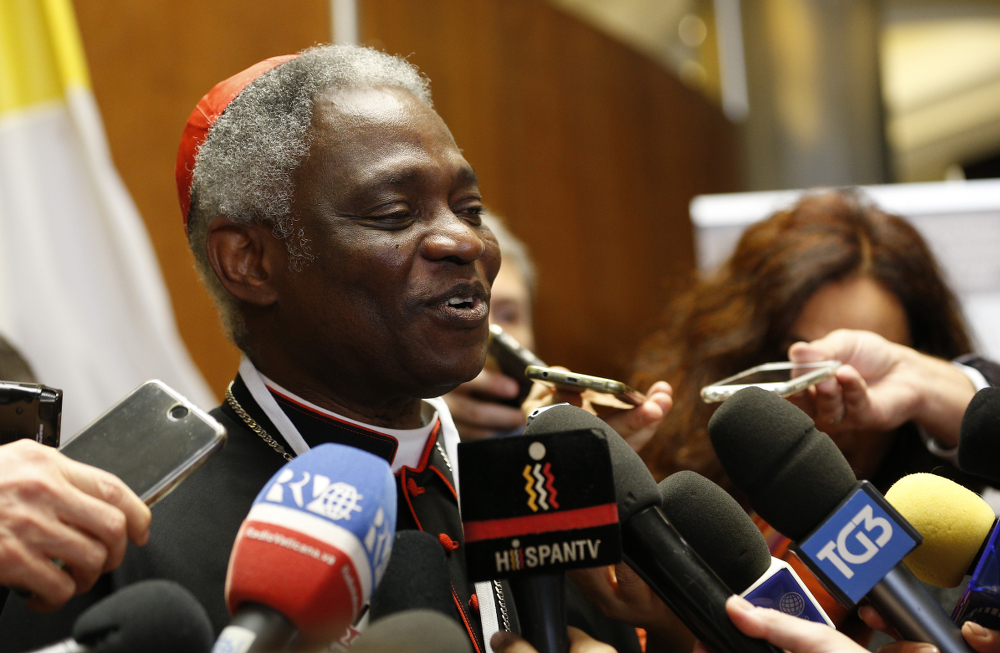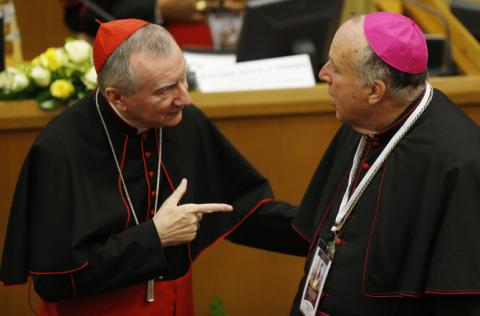
Cardinal Peter Turkson, prefect of the Vatican's Dicastery for Promoting Integral Human Development, speaks to journalists during a conference on building a world free of nuclear weapons, at the Vatican Nov. 10. (CNS photo/Paul Haring)
Pope Francis has openly denounced the continuing possession of nuclear weapons by various world governments, in what appears to be a departure from the Roman Catholic Church's prior acceptance of the Cold War-era global system of nuclear deterrence and mutually assured destruction.
In a talk Nov. 10 to participants in a high-profile Vatican conference on nuclear disarmament, the pope also seemed to indirectly criticize world leaders such as U.S. President Donald Trump, who has openly threatened nuclear war with North Korea over that country's continuing development of nuclear arms.
Francis told the conference participants — who include the U.N. High Representative for Disarmament Affairs, NATO's deputy secretary general, and 11 Nobel Peace Prize laureates — that humanity cannot fail "to be genuinely concerned by the catastrophic humanitarian and environmental effects of any employment of nuclear devices."
"If we also take into account the risk of an accidental detonation as a result of error of any kind, the threat of their use, as well as their very possession, is to be firmly condemned," he said.
"International relations cannot be held captive to military force, mutual intimidation, and the parading of stockpiles of arms," the pope continued. "Weapons of mass destruction, particularly nuclear weapons, create nothing but a false sense of security. They cannot constitute the basis for peaceful coexistence between members of the human family."
While previous popes have called for the abolition of nuclear weapons, they also granted conditional moral acceptance to the system of nuclear deterrence, which arose after World War II when the United States and the Soviet Union stockpiled nuclear weapons in order to discourage either country from launching an atomic attack.
Pope John Paul II, for example, said in a message to the U.N. in June 1982 that the system of deterrence could be judged "morally acceptable" as "a step on the way toward a progressive disarmament."
The Vatican conference, hosted Nov. 10-11 by the new Dicastery for Promoting Integral Human Development, is the first major international gathering on disarmament since 122 countries signed a new U.N. treaty in July that calls for the complete elimination of nuclear weapons.
The Vatican is one of three signatories that have already ratified the agreement. None of the nuclear powers and no NATO members have signed on to the measure.
The disarmament conference is taking place as Trump is on an 11-day visit to several Asian nations. In South Korea Nov. 8, Trump warned North Korean leader Kim Jong Un that his quest to acquire nuclear weapons is putting his regime "in grave danger" and threatened: "Do not try us."
Cardinal Peter Turkson, the head of the Vatican dicastery, said at the conference's opening Nov. 10 that the event was planned long before Trump's visit to Asia was announced. "It just happens to be a happy coincidence," Turkson joked, adding: "If we believe in divine providence, that was part of it."
Turkson said he and the participants at the event had gathered "for a very candid conversation about how to achieve a world free of nuclear weapons."
In an apparent nod to North Korea, he added: "This conversation is urgently needed, given the current tensions among nuclear weapons states and given the tensions between nuclear weapons states and states seeking to become nuclear weapons states."
Cardinal Pietro Parolin, the Vatican's Secretary of State, told the conference their considerations take place during a "decidedly disheartening state of affairs" across the world.
Parolin noted that 2017 marks the 50th anniversary of Pope Paul VI's encyclical Populorum progressio, which proposed that the world's governments set aside a portion of their military spending for a global fund to relieve the needs of impoverished peoples.
Paraphrasing the encyclical, he stated: "Is it not plain to everyone that such a fund would reduce a need for those other expenditures that are motivated by fear [or] stubborn pride? Countless millions are starving. We cannot approve a debilitating arms race."
'Ethic of nuclear deterrence not morally warranted'
One of the speakers at the Vatican conference said he hopes it refocuses world attention on the nuclear ban treaty.
"At a time of irresponsible nuclear brinksmanship over North Korea … the Holy See is engaged in a high-profile effort to change the debate and refocus attention on the disarmament momentum generated by the July nuclear ban treaty," said Gerard Powers, director of Catholic Peacebuilding Studies at the University of Notre Dame's Kroc Institute for International Peace Studies.
"The Holy See is sending a clear message that the moral imperative of nuclear disarmament is and should be at the center of the Church's international agenda for peace," said Powers, speaking in an interview earlier in the week.
San Diego Bishop Robert McElroy, who is to speak at the conference Nov. 11 on the role of the church in the global disarmament discussion, also said the wider church should reevaluate the conditional acceptance given to the global system of nuclear deterrence during the Cold War.
"I think the church should be saying the ethic of nuclear deterrence is not morally warranted any longer," said the prelate, who also serves as a member of the U.S. bishops' committee on international justice and peace.
McElroy pointed to the fact that the conditional acceptance of deterrence was given with the understanding that the nations of the world would gradually move to disarm.
"Deterrence was accepted in a specific set of conditions; namely, that the nations of the world, individually and together, would be moving toward disarmament," he said. "That has not happened."
"The condition under which there was a limited acceptance … those conditions have evaporated," said McElroy, who is also set to speak later in the month at a conference in South Korea on how Catholic peacebuilding principles can be used to help promote reconciliation on the Korean peninsula.

Cardinal Pietro Parolin, Vatican secretary of state, talks with Bishop Robert W. McElroy of San Diego during a conference on building a world free of nuclear weapons, at the Vatican Nov. 10. (CNS photo/Paul Haring)
Francis spoke to the conference Nov. 10 after receiving a letter from five of the Nobel laureates at the event, who thanked him for his focus on disarmament and told him that "national security frameworks that rely on weapons, militaries, and the projection of state power cannot possibility protect us from the challenges of today's world."
The pope said that "progress that is both effective and inclusive can achieve the utopia of a world free of deadly instruments of aggression, contrary to the criticism of those who consider idealistic any process of dismantling arsenals."
In his speech to the conference, Turkson also spoke about how military spending diverts funding away from other areas, such as healthcare.
He quoted from a speech given by U.S. President Dwight Eisenhower in 1953, in which the former Allied Supreme Commander said: "Every gun that is made … signifies, in the final sense, a theft from those who hunger and are not fed, those who are cold and are not clothed."
"Nuclear armament is never an appropriate policy to achieve a long-term basis for peace," said Turkson. "And true security is not found in the size of our military or the number of weapons we possess, but when every human need for food, for housing, for healthcare, for employment and dignity is met — that's when we begin to fashion peace."
In his NCR interview, McElroy also called for a "fundamental reappraisal" of how the church balances Jesus' message of non-violence with the need to resist evil. He said that parts of the just war theory, a long-held tradition that uses a series of criteria to evaluate whether use of violence can be considered morally justifiable, are able to be co-opted by governments seeking to go to war.
McElroy said the church must "recognize the increasing incapacity of the just war tradition to be an effective constraint on warfare in the modern age." He gave the example of the U.S. invasion of Iraq in 2003, when the George W. Bush administration made a case for the invasion using just war language.
Just war principles, he said, "have become only a little bit less than a green light. Not because they're intrinsically defective, but because they are constructed without a sense of nuance that allows them to be coopted by countries that simply wish to go to war."
"Our Second Iraq War is a primary example of that," said McElroy. "The just war tradition was used specifically to justify going to war, in a war which was never justifiable."
[Joshua J. McElwee is NCR Vatican correspondent. His email address is jmcelwee@ncronline.org. Follow him on Twitter: @joshjmac.]
Advertisement








